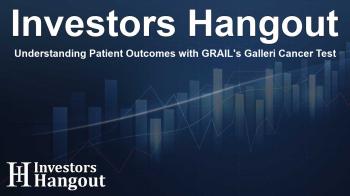Understanding Patient Outcomes with GRAIL's Galleri Cancer Test

Impact of GRAIL's Galleri Test on Patient Experiences
GRAIL, Inc. (NASDAQ: GRAL) has been pioneering in the field of early cancer detection, and their recent publication in Lancet Oncology highlights the importance of patient-reported outcomes (PRO) in understanding the impact of their Galleri test. The PATHFINDER study, a significant part of this research, focuses on assessing how individuals perceive multi-cancer early detection (MCED) testing.
Overview of the PATHFINDER Study
Conducted over a 12-month follow-up period, the PATHFINDER study evaluated PRO metrics among participants who either had a cancer signal detected (CSD) or no cancer signal detected (NCSD). This analysis aimed to measure the level of anxiety, distress, and overall satisfaction regarding the Galleri test. Patients reported their feelings of uncertainty and health-related quality of life after receiving their test results. Various assessment tools were employed, including the Multidimensional Impact of Cancer Risk Assessment and the PROMIS Anxiety short-form.
Key Findings on Patient Satisfaction
Interestingly, the study found that while anxiety is common following cancer screenings, it was often short-lived. Most participants expressed relief with their NCSD results. In fact, even those with CSD were satisfied with their decision to undergo testing, leading to a commitment to maintain regular screenings in conjunction with MCED tests.
Expert Insights on Patient Perspectives
Lincoln Nadauld, MD, who led this study, emphasized the continuity of care that comes from understanding patient sentiments. According to him, these findings reflect a promising landscape where MCED testing causes minimal distress, allowing patients to feel secure in their healthcare journey. Furthermore, Eric Klein, MD, co-author of the study and a distinguished scientist at GRAIL, noted the importance of incorporating patient feedback into clinical practices. He indicated that fostering positive participant experiences can lead to better adherence to follow-up screenings, which is vital in cancer detection and treatment.
GRAIL's Mission and Technological Innovations
At GRAIL, the mission transcends traditional cancer detection methods. Their focus lies in employing advanced technologies such as next-generation sequencing and machine learning to detect various cancer types at early stages when they can be treated effectively. The innovative Galleri test serves as a proactive solution, utilizing a straightforward blood draw to identify cancer cell DNA—acting as a fingerprint for potentially serious cancers without established routine screenings.
Galleri's Potential and Usage Recommendations
Galleri's capability to pinpoint the origin of cancer is especially beneficial for medical professionals, providing them a roadmap for further diagnostic exploration. It's crucial to note that for patients, this test is recommended in conjunction with routine screenings like mammography and colonoscopy, primarily targeting those with elevated cancer risks, particularly those over the age of 50.
Commitment to Quality and Safety
GRAIL adheres to stringent quality control measures, with their clinical laboratory certified under the Clinical Laboratory Improvement Amendments. However, it is vital to understand that while Galleri can indicate a cancer signal, it is not a definitive confirmation of cancer. Healthcare providers play an essential role in interpreting test results, which should always be followed by confirmatory diagnostic evaluations when indicated.
Frequently Asked Questions
What is the Galleri test?
The Galleri test is a multi-cancer early detection test that can identify DNA shed by cancer cells through a simple blood draw.
How does the Galleri test impact patient anxiety?
Research shows that while initial anxiety may increase post-testing, most patients report relief and satisfaction with their results over time.
Who should consider the Galleri test?
The test is primarily recommended for adults aged 50 or older, especially those at elevated risk for cancer.
What types of cancer can Galleri detect?
Galleri can screen for several cancers, including those that currently lack routine screening methods, such as pancreatic and ovarian cancer.
Is the Galleri test approved by the FDA?
The test has not been FDA-cleared or approved but is regulated under CLIA for high-complexity testing.
About Investors Hangout
Investors Hangout is a leading online stock forum for financial discussion and learning, offering a wide range of free tools and resources. It draws in traders of all levels, who exchange market knowledge, investigate trading tactics, and keep an eye on industry developments in real time. Featuring financial articles, stock message boards, quotes, charts, company profiles, and live news updates. Through cooperative learning and a wealth of informational resources, it helps users from novices creating their first portfolios to experts honing their techniques. Join Investors Hangout today: https://investorshangout.com/
Disclaimer: The content of this article is solely for general informational purposes only; it does not represent legal, financial, or investment advice. Investors Hangout does not offer financial advice; the author is not a licensed financial advisor. Consult a qualified advisor before making any financial or investment decisions based on this article. The author's interpretation of publicly available data shapes the opinions presented here; as a result, they should not be taken as advice to purchase, sell, or hold any securities mentioned or any other investments. The author does not guarantee the accuracy, completeness, or timeliness of any material, providing it "as is." Information and market conditions may change; past performance is not indicative of future outcomes. If any of the material offered here is inaccurate, please contact us for corrections.
